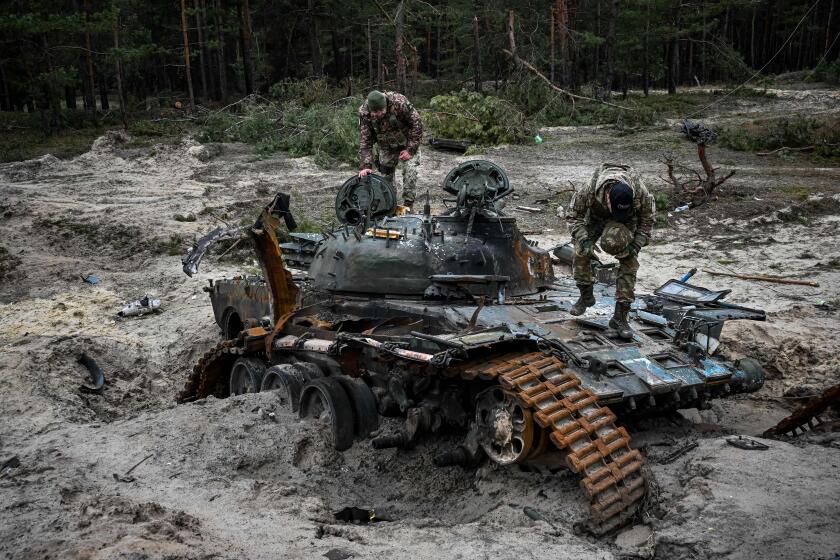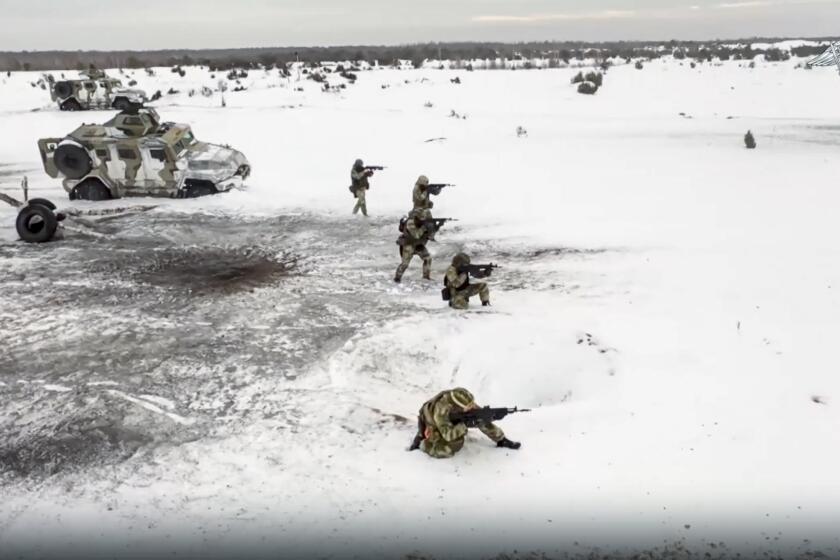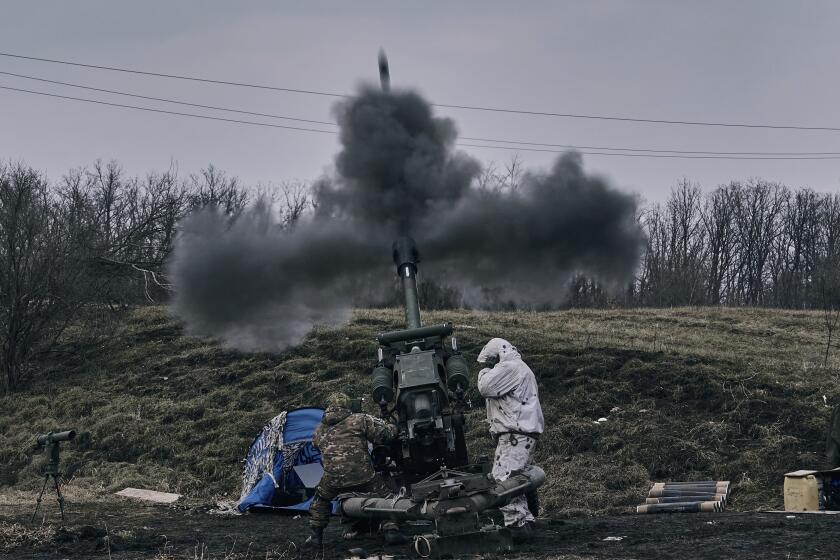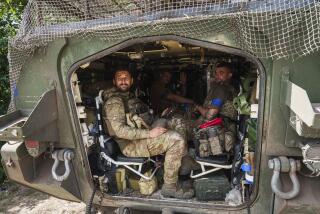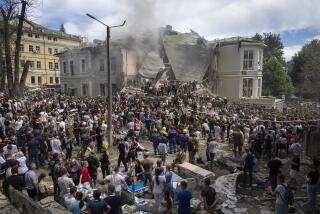Rebounding from Russian barrage, Ukraine restores power supply
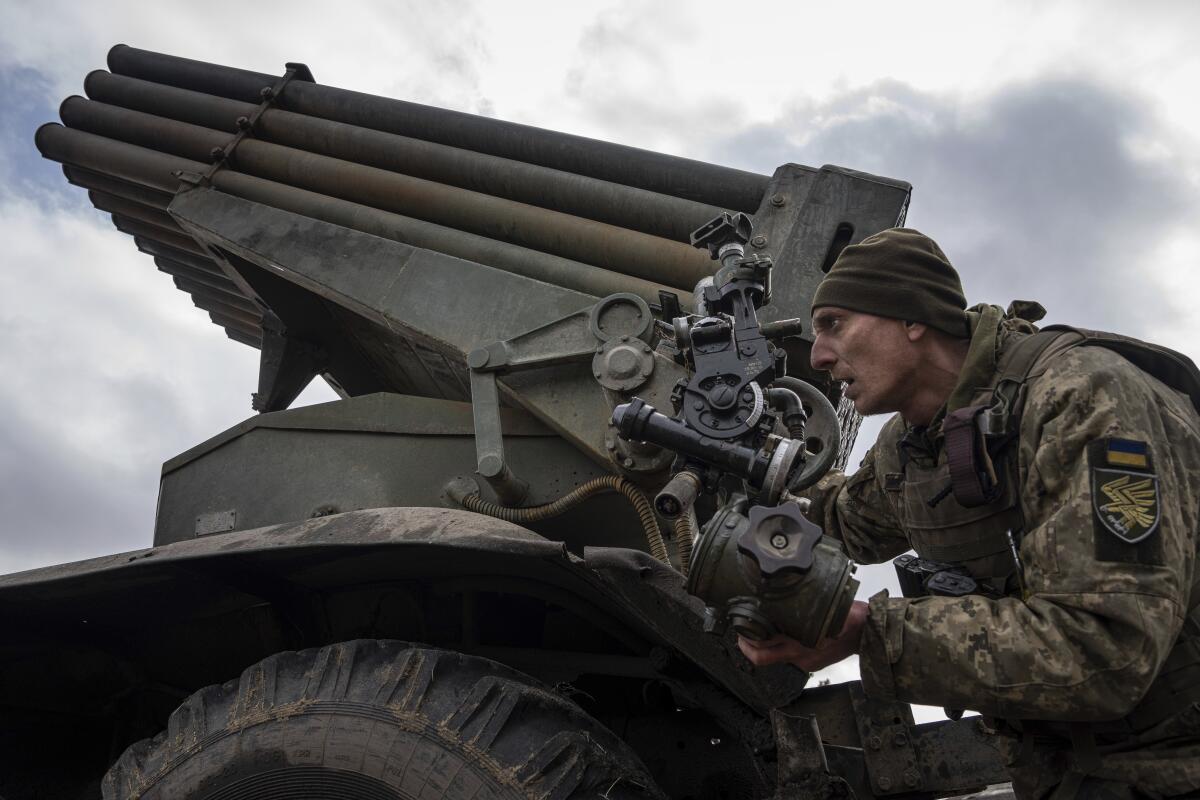
- Share via
KYIV, Ukraine — Ukraine’s capital restored most of its power supply Friday, officials said, as the country responded swiftly to the latest Russian missile and drone barrage targeting critical infrastructure.
In what has become a familiar Russian tactic since the fall, the Kremlin’s forces struck Ukraine from afar Thursday amid months of a grinding battlefield stalemate on the war’s front line in eastern areas. The apparent aim is to weaken Ukraine’s resolve and compel the Ukrainian government to negotiate peace on Moscow’s terms.
Ukrainian authorities scrambled to counter the bombardment’s consequences, part of a recurring cycle of urban smash-and-repair that has brought little change in the war, which recently entered its second year.
The Institute for the Study of War, a Washington-based think tank, said in an assessment that “these missile strikes will not undermine Ukraine’s will or improve Russia’s positions on the front lines.”
Ukrainian military analyst Oleh Zhdanov said the Russians are striking civilian infrastructure because they can’t efficiently target Ukrainian military assets.
“The Russians lack data about the location of Ukrainian troops and weapons, so they are targeting civilian infrastructure and using the same old methods of attacking civilians to sow fear and panic in the society,” he said. “Ukraine has survived the winter and Russia’s strikes on the energy system in the spring hardly make any sense.”
The Ukrainian military’s surrender hotline, dubbed ‘I Want to Live,’ is enticing some Russian soldiers to quit the battlefield as the war drags on.
Power and water were restored in Kyiv, said Serhii Popko, the head of the city’s military administration. Popko said that about 30% of consumers in the capital remained without heating and that repair work was ongoing.
Power supplies were fully restored in Ukraine’s southern Odesa region, private provider DTEK said Friday afternoon.
Around 60% of households in the city of Kharkiv that were knocked off grid by Russia’s missile strikes on Thursday were also back online, authorities said, though significant damage remained in the Zhytomyr and Kharkiv regions in Ukraine’s northwest and northeast, respectively.
In another sign of normality quickly returning, Prime Minister Sanna Marin of Finland made an unannounced visit to Kyiv on Friday.
Marin accompanied Ukrainian President Volodymyr Zelensky and senior military officers to the funeral of one of Ukrain’e best known fighters and commanders who was killed in fighting near the devastated eastern city of Bakhmut.
The service for Dmytro Kotsiubailo, killed a few days earlier at the age of 27, was held at the cathedral of Kyiv’s St. Michael’s Golden-Domed Monastery. Many of the thousands of mourners clutched flowers, and the crowd knelt in silence as Kotsiubailo’s coffin was carried out of the church toward Maidan Square.
Zelensky and Marin also laid flowers at a nearby memorial to fallen Ukrainian soldiers.
The Finnish premier echoed other Western leaders who have accused Russia of war crimes in Ukraine and said Russian soldiers and leaders would be held accountable in a courtroom.
Anti-government guerrillas inside Belarus are carrying out acts of sabotage to impede their country’s cooperation with Russia in the war on Ukraine.
“Putin knows he will have to answer for his crime of aggression,” the Finnish leader said during a news conference, referring to Russian President Vladimir Putin. “The future tribunal must bring justice efficiently and answer Ukrainians’ rightful demands.”
On the battlefield Friday, Ukrainian Deputy Defense Minister Hanna Malyar said the fighting in Bakhmut had “escalated,” with another push by Russian forces to break through Ukrainian defense lines that have largely held firm for the past six months.
Just west of Bakhmut, shelling and missile strikes hit the Ukrainian-held city of Kostiantynivka, damaging multiple homes. The regional prosecutor’s office said eight people were injured and more than a dozen homes were damaged or destroyed in the attacks.
Associated Press journalists in the city saw at least four injured people taken to a local hospital. Police said Russian forces attacked the town with S-300 missiles and cluster munitions.
Thursday’s Russian onslaught, much of which took place before dawn, was the largest such attack in three weeks, deploying more than 80 Russian missiles and exploding drones.
The barrage, which also damaged residential buildings, killed six people and left hundreds of thousands without heat or running water. The salvo was noteworthy for the range of munitions the Kremlin’s forces used, including hypersonic Kinzhal cruise missiles, which are among the most sophisticated weapons in Russian’s arsenal.
The owner of Russia’s Wagner Group military company says his forces have extended gains in Bakhmut in the war’s longest battle, but it’s unclear how long the fight might go on.
Even so, the bombardments on energy infrastructure that gathered pace last fall have become less frequent.
“The interval between waves of strikes is probably growing, because Russia now needs to stockpile a critical mass of newly produced missiles directly from industry,” the British Ministry of Defense said in an assessment Friday.
The Russian Defense Ministry said the strikes were in retaliation for a recent incursion into the Bryansk region of western Russia by what Moscow claimed were Ukrainian saboteurs. Ukraine denied the claim and warned that Moscow could use the allegations to justify stepping up its own assaults.
More to Read
Sign up for Essential California
The most important California stories and recommendations in your inbox every morning.
You may occasionally receive promotional content from the Los Angeles Times.
